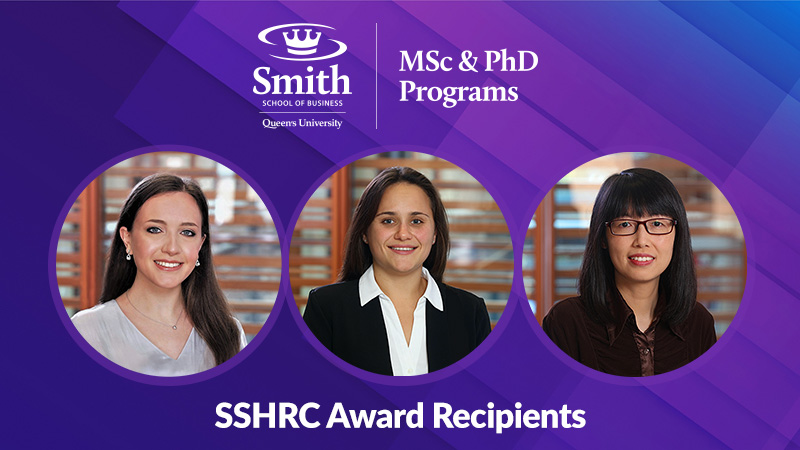Smith PhD students receive $270,000 in funding from SSHRC
Posted on May 1, 2024
Kingston, Ont. – Research being conducted by three Smith PhD candidates has received a boost in the form of federal funding from the Social Sciences and Humanities Research Council (SSHRC).
PhD candidates Michalina Woznowski, MSc’22, and Lifang Zhang have been awarded Canada Graduate Scholarships, each valued at $105,000; and fellow PhD candidate Sophia Mannina, MSc’21, is the recipient of a SSHRC Doctoral Fellowship valued at $60,000. These results reflect the 2022 competition, which were formally announced in March 2024.
Woznowski is in the PhD program’s organizational behaviour stream and explores the ways in which teams can be optimized for performance and well-being among members. She’s looked at team structure and its impact on ethical decision-making, the effects of multi-communicating on team effectiveness, and the integration of newcomers in teams.
Her research, Virtual Work as a Double-Edged Sword: Examining the Trade-off Between Autonomy and Belongingness, looks at the “critical” trade-off that hybrid and remote workers face.
“While these workers experience the benefits of added flexibility and autonomy, they often have fewer opportunities to interact with others, which can result in a reduced sense of belongingness,” Woznowski explains.
While sharing the same physical work environment fosters connection, she says this is just one element of team interdependence. This research, Woznowski says, proposes that by altering the levels of other types of team interdependence, such as task and outcome interdependence, “organizations can structure hybrid and remote teams in a way that creates an optimal balance between the critical needs for autonomy and belongingness.”
As an international business PhD candidate, Zhang explores global sustainability from various interconnected perspectives in her research, including corporations, suppliers, policymakers and civil societies. “I’m particularly passionate about studying the interactions and dynamics among diverse stakeholders to facilitate global sustainability efforts,” she says.
Her current research, Is Environmental Upgrading Attainable in the Global Value Chain? Evidence from Artisanal and Small-Scale Mining (ASM) in Africa, looks at the challenges and feasibility of mitigating the adverse environmental impacts and contributing to sustainable livelihoods in these communities.
“While global value chains provide multinational corporations with cost advantages and offer producers a means of engaging in the global economy…widespread mercury use, water pollution and deforestation pose serious environmental and health hazards to the 100 million people in the ASM communities whose livelihoods depend on the global market,” Zhang explains. “By taking a more inclusive view of who counts and incorporating different perspectives, I aspire to make meaningful contributions to addressing the grand challenges of global sustainability.”
Mannina’s research interests lie in the management information systems PhD stream. She looks at how digital technologies impact consumers’ health and well-being, including the effectiveness of mobile health apps and user responses to health misinformation on social media.
In the research, Developing an Interpretive Theory of Mobile Health Application Success, she and her co-author are seeking to better understand users’ journeys with mobile health apps and their perceptions of success.
“There is great potential for digital technologies and innovations to positively transform consumers’ access to medical advice and management of personal well-being,” she says. “It’s my hope that my research will contribute to progress in this area and facilitate improved understanding, development and use of digital technologies in health-related contexts.”
Through these two SSHRC programs, these three researchers have earned multi-year funding that will allow them to focus on their doctoral studies and contribute to Canada’s research ecosystem.
“Our doctoral students are doing cutting-edge research on issues that extend well beyond business, to have implications for health, wellness and sustainability in Canada and beyond. We’re exceptionally proud of these researchers and the acknowledgement of their work by SSHRC,” says Lynnette Purda, associate dean (graduate programs).